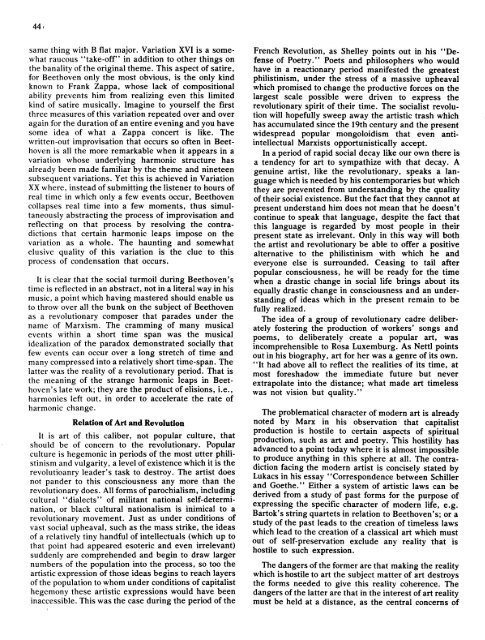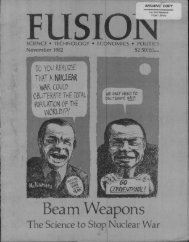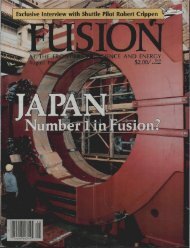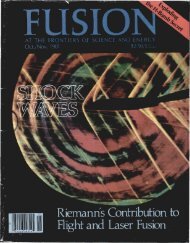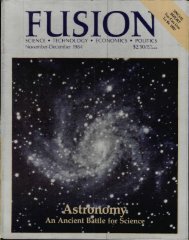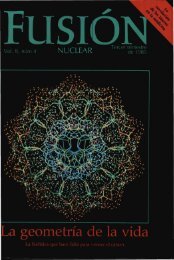New Left, Local Control, and Fascism
New Left, Local Control, and Fascism
New Left, Local Control, and Fascism
Create successful ePaper yourself
Turn your PDF publications into a flip-book with our unique Google optimized e-Paper software.
44,<br />
same thing with B flat major. Variation XVI is a some- French Revolution, as Shelley points out in his "Dewhat<br />
raucous "take-off" in addition to other things on fense of Poetry." Poets <strong>and</strong> philosophers who would<br />
the banality of the original theme. This aspect of satire, have in a reactionary period manifested the greatest<br />
for Beethoven only the most obvious, is the only kind philistinism, under the stress of a massive upheaval<br />
known to Frank Zappa, whose lack of compositional which promised to change the productive forces on the<br />
ability prevents him from realizing even this limited largest scale possible were driven to express the<br />
kind of satire musically. Imagine to yourself the first revolutionary spirit of their time. The socialist revoluthree<br />
measures of this variation repeated over <strong>and</strong> over tion will hopefully sweep away the artistic trash which<br />
again for the duration of an entire evening <strong>and</strong> you have has accumulated since the 19th century <strong>and</strong> the present<br />
some idea of what a Zappa concert is like. The widespread popular mongoloidism that even antiwritten-out<br />
improvisation that occurs so often in Beet- intellectual Marxists opportunistically accept.<br />
hoven is all the more remarkable when it appears in a In a period of rapid social decay like our own there is<br />
variation whose underlying harmonic structure has a tendency for art to sympathize with that decay. A<br />
already been made familiar by the theme <strong>and</strong> nineteen genuine artist, like the revolutionary, speaks a lansubsequent<br />
variations. Yet this is achieved in Variation guage which is needed by his contemporaries but which<br />
XX where, instead of submitting the listener to hours of they are prevented from underst<strong>and</strong>ing by the quality<br />
real time in which only a few events occur, Beethoven of their social existence. But the fact that they cannot at<br />
collapses real time into a few moments, thus simul- present underst<strong>and</strong> him does not mean that he doesn't<br />
taneously abstracting the process of improvisation <strong>and</strong> continue to speak that language, despite the fact that<br />
reflecting on that process by resolving the contra- this language is regarded by most people in their<br />
dictions that certain harmonic leaps impose on the present state as irrelevant. Only in this way will both<br />
variation as a whole. The haunting <strong>and</strong> somewhat the artist <strong>and</strong> revolutionary be able to offer a positive<br />
elusive quality of this variation is the clue to this alternative to the philistinism with which he <strong>and</strong><br />
process of condensation that occurs, everyone else is surrounded. Ceasing to tail after<br />
popular consciousness, he will be ready for the time<br />
It is clear that the social turmoil during Beethoven's when a drastic change in social life brings about its<br />
time is reflected in an abstract, not in a literal way in his equally drastic change in consciousness <strong>and</strong> an undermusic,<br />
a point which having mastered should enable us st<strong>and</strong>ing of ideas which in the present remain to be<br />
to throw over all the bunk on the subject of Beethoven fully realized.<br />
as a revolutionary composer that parades under the The idea of a group of revolutionary cadre delibername<br />
of Marxism. The cramming of many musical ately fostering the production of workers' songs <strong>and</strong><br />
events within a short time span was the musical poems, to deliberately create a popular art, was<br />
idealization of the paradox demonstrated socially that incomprehensible to Rosa Luxemburg. As Nettl points<br />
few events can occur over a long stretch of time <strong>and</strong> out in his biography, art for her was a genre of its own.<br />
many compressed into a relatively short time-span. The "It had above all to reflect the realities of its time, at<br />
latter was the reality of a revolutionary period. That is most foreshadow the immediate future but never<br />
the meaning of the strange harmonic leaps in Beet- extrapolate into the distance; what made art timeless<br />
hoven's late work; they are the product of elisions, i.e., was not vision but quality."<br />
harmonies left out, in order to accelerate the rate of<br />
harmonic change. The problematical character of modern art is already<br />
Relation of Art <strong>and</strong> Revolution noted by Marx in his observation that capitalist<br />
production is hostile to certain aspects of spiritual<br />
It is art of this caliber, not popular culture, that production, such as art <strong>and</strong> poetry. This hostility has<br />
should be of concern to the revolutionary. Popular advanced to a point today where it is almost impossible<br />
culture is hegemonic in periods of the most utter phili- to produce anything in this sphere at all. The contrastinism<br />
<strong>and</strong> vulgarity, a level of existence which it is the diction facing the modern artist is concisely stated by<br />
revolutioanry leader's task to destroy. The artist does Lukacs in his essay "Correspondence between Schiller<br />
not p<strong>and</strong>er to this consciousness any more than the <strong>and</strong> Goethe." Either a system of artistic laws can be<br />
revolutionary does. All forms of parochialism, including derived from a study of past forms for the purpose of<br />
cultural "dialects" of militant national self-determi- expressing the specific character of modern life, e.g.<br />
nation, or black cultural nationalism is inimical to a Bartok's string quartets in relation to Beethoven's; or a<br />
revolutionary movement. Just as under conditions of<br />
study of the past leads to the creation of timeless laws<br />
vast social upheaval, such as the mass strike, the ideas which lead to the creation of a classical art which must<br />
of a relatively tiny h<strong>and</strong>ful of intellectuals (which up to<br />
out of self-preservation exclude any reality that is<br />
that point had appeared esoteric <strong>and</strong> even irrelevant) hostile to such expression.<br />
suddenly are comprehended <strong>and</strong> begin to draw larger<br />
numbers of the population into the process, so too the The dangers of the former are that making the reality<br />
artistic expression of those ideas begins to reach layers which is hostile to art the subject matter of art destroys<br />
of the population to whom under conditions of capitalist the forms needed to give this reality coherence. The<br />
hegemony these artistic expressions would have been dangers of the latter are that in the interest of art reality<br />
inaccessible. This was the case during the period of the must be held at a distance, as the central concerns of


